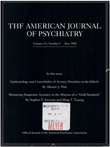Predicting feasibility of day treatment for unselected patients referred for inpatient psychiatric treatment: results of a randomized trial
Abstract
OBJECTIVE: Because previous studies of day treatment as an alternative to inpatient treatment had major disadvantages or methodological shortcomings, the authors conducted a randomized controlled trial to estimate and predict the extent to which day treatment is feasible for unselected patients referred for inpatient treatment. METHOD: Of 160 patients, 57 were randomly assigned to the control condition and 103 were assigned to the experimental condition. Control patients received standard clinical care. In the experimental condition, day treatment was attempted as soon as the patient's condition permitted. The average number of nights per week that experimental patients spent away from the hospital was compared to the average number of nights away for patients under standard care. RESULTS: Day treatment was satisfactory for 40% of the experimental patients but was completely infeasible for another 40%. The level of surveillance needed in the first week, physical illness, number of previous admissions, depressive symptoms, and treatment by qualified psychiatrists versus registrars were variables predictive of these differences. CONCLUSIONS: In this unselected group of patients, no absolute contraindications against day treatment were found. This suggests that the selection criteria applied in nearly all other controlled studies on the subject were unwarranted. The approach used in this study facilitated treatment in the least restrictive environment possible.
Access content
To read the fulltext, please use one of the options below to sign in or purchase access.- Personal login
- Institutional Login
- Sign in via OpenAthens
- Register for access
-
Please login/register if you wish to pair your device and check access availability.
Not a subscriber?
PsychiatryOnline subscription options offer access to the DSM-5 library, books, journals, CME, and patient resources. This all-in-one virtual library provides psychiatrists and mental health professionals with key resources for diagnosis, treatment, research, and professional development.
Need more help? PsychiatryOnline Customer Service may be reached by emailing [email protected] or by calling 800-368-5777 (in the U.S.) or 703-907-7322 (outside the U.S.).



